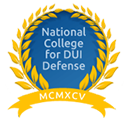

Breathalyzer
After a DUI arrest, the arresting officer will usually ask you to submit to a breath test. Ohio law provides for numerous rules related to how the breath test must be administered and how the machine must be maintained and calibrated.
Some of the most often cited rules including a requirement for a 30 minute observation period before the breath test is conducted. Also, the test must be performed within a two-hour limit prescribed for such tests by statute.
Your attorney can file a motion to suppress the results of the breath test reading when the test was not conducted in substantial compliance with Ohio Department of Health Regulations and administrative rules concerning the maintenance and calibration. The motion to suppress the breath test reading if the operator did not properly administrate the breath test.
Attorneys for Breathalyzer Alcohol Testing in Ohio
With offices located at 9415 Montgomery Rd, Suite D, in Cincinnati, OH, the attorneys at Joslyn Law Firm represent clients throughout Montgomery County, Greene County and Miami County, Ohio.
If you were charged with Operating a Motor Vehicle while Impaired by either being “under the influence” in violation of R.C. 4511.19(A)(1)(a) or driving with a “prohibited level” in violation of R.C. 4511.19(A)(1)(d), then contact an experienced DUI defense attorney in Cincinnati, OH, at Joslyn Law Firm.
Substantial Compliance with Administrative Rules for Alcohol Test
The courts in Ohio have “frequently emphasized the necessity of the State producing sufficient competent evidence of compliance with Department of Health regulations in a [DUI] per se violation case, where the test results provide the ultimate answer to the question of guilt or innocence.” State v. Berry (Dec. 19.1996), Butler App. No. 95CA04022, unreported, at 2, citing Coshocton v. Davis (Dec. 4, 1990), 90-CA-7, unreported, at 1.
For instance, in Mentorv. Giordano, 90 Ohio St.2d 140 (1967), the court noted that it is incumbent upon the State to prove the B.A.C. verifier was in proper working order for a breath test to be admissible in court.
Your criminal defense attorney must carefully audit the breath test machine used in your case to look at the annual and monthly inspections, repair, and calibration records, and subject tests both before and after you submitted to the test.
What if my Breath Test Was Taken Hours After the Traffic Stop?
R.C. Section 4511.19(D)(1) “The Court may admit evidence of chemical tests taken within three hours of the alleged violation.” “A blood sample taken outside the time frame set out in R.C. Section 4511(d) is admissible to prove that a person is under the influence of alcohol as prescribed by R.C. Section 4511.19(A)(1)(a) in the prosecution for a violation of R.C. Section 2903.06, provided that the administrative requirements of R.C. Section 4511.19(D) are substantially complied with and expert testimony is offered.” State v. Hassler (2007), 115 Ohio St. 3d 322.
What if my BAC is Less than the Legal Limit of .08?
Pursuant to R.C. Section 4511.19(D)(2), if the test results are less than the per se levels, the results may be considered with other competent evidence in determining the guilt or innocence of the defendant.
Challenging the Accuracy of the Breath Test Result
“Ohio’s driving while intoxicated statute defines the point the legislature has determined an individual cannot drive without posing a substantial danger, not only to himself, but to others. The defendant may still challenge the accuracy of his specific test results, although he may not challenge the general accuracy of the legislatively determined test procedures as a valid scientific means of determining blood alcohol levels. The jury may consider those specific test results, and all other relevant evidence, in ascertaining whether the state has shown beyond a reasonable doubt that the defendant has violated the statute.” State v. Tanner (1984), 15 Ohio St. 3d 1.
Ohio’s Alcohol Testing Program
Ohio’s Alcohol/Drug Testing Approval and Permit Program formulates and enforces the Director of Health’s Administrative Rules OAC 3701-53-01 through 10. The Ohio’s alcohol testing program involve the following functions:
- Issuing permits for breath, and blood or urine testing for alcohol, and blood or urine testing for alcohol or drugs;
- Revoking permits from permit holders who fail to comply with OAC 3701-53-01 through 09;
- Approving evidential breath testing instruments;
- Approving techniques to determine the concentration of drugs in blood and urine;
- Approving techniques to determine the concentration of alcohol in blood, urine and breath;
- Overseeing the certification of Simulator Solutions used in evidential breath testing;
- Devising protocols to ensure the proper and consistent operation of evidential breath testing instruments;
- Creating basic requirements for the retention of records and specimens pursuant to breath for alcohol, and blood and urine for alcohol or drugs;
- Creating basic proficiency requirements pursuant to breath, and blood or urine testing for alcohol, and blood or urine testing for alcohol or drugs; and
- Creating basic requirements for personnel performing breath, and blood or urine testing for alcohol, and blood or urine testing for alcohol or drugs.
Alcohol Breath Testing Methods in Ohio
Ohio's Administrative Code for the techniques or methods of alcohol testing can be found in 3701-53-01. The rule applies to tests to determine the concentration of alcohol may be applied to blood, breath, urine, or other bodily substances. Results shall be expressed as equivalent to:
- Grams by weight of alcohol per one hundred milliliters of whole blood, blood serum or plasma (grams per cent by weight);
- Grams by weight of alcohol per two hundred ten liters of deep lung breath;
- Grams by weight of alcohol per one hundred milliliters of urine (grams per cent by weight).
- Nanograms by weight of a controlled substances or a metabolite or a controlled substance per milliliter of blood, urine, or other bodily substance.
The administrative rules require that the results of the tests must be retained for not less than three years. Additionally, at least one copy of the written procedure manual required by rule 3701-53-06(D) of the Administrative Code for performing blood, urine, or other bodily substance tests shall be on file in the area where the analytical tests are performed.
Breath Testing Administrative Rules in Ohio
Ohio's Administrative Code for the breath tests can be found in 3701-53-02. Ohio has approved the following evidential breath testing instruments for use in determining whether a person's breath contains a concentration of alcohol prohibited or defined by sections 4511.19, and/or 1547.11 of the Revised Code, or any other equivalent statute or local ordinance prescribing a defined or prohibited breath-alcohol concentration. The approved evidential breath testing instruments are:
- BAC DataMaster, BAC DataMaster K, BAC DataMaster cdm;
- Intoxilyzer model 5000 series 66, 68 and 68 EN; and
- Intoxilyzer model 8000 (OH-5).
Under Rule 3701-53-02(B), the breath testing instruments below are approved as additional evidential breath testing instruments for use in determining whether a person's breath contains a concentration of alcohol prohibited or defined by section 1547.11 of the Revised Code, or any other equivalent statute or local ordinance prescribing a defined or prohibited breath alcohol concentration. The approved evidential breath testing instrument is:
- Intoxilyzer model 8000 (OH-2).
Under Rule 3701-53-02(C), breath samples of deep lung (alveolar) air shall be analyzed for purposes of determining whether a person has a prohibited breath alcohol concentration with instruments approved under the rules.
Breath samples must be analyzed according to the operational checklist for the instrument being used and checklist forms recording the results of subject tests shall be retained in accordance with paragraph (A) of rule 3701-53-01 of the Administrative Code. The results shall be recorded on forms prescribed by the director of health.
Breath samples must be analyzed according to the instrument display for the instrument being used. The results of subject tests shall be retained in a manner prescribed by the director of health and shall be retained in accordance with paragraph (A) of rule 3701-53-01 of the Administrative Code.
ALS Positive Test Consequences
Ohio law provides for the following ALS suspension lengths after an ALS positive breath test consequences at or over .08:
- for a first offense, the ALS suspension length is 90 days;
- for a second offense within a six-year period, the ALS suspension length is one year;
- for a third offense within a six-year period, the ALS suspension length is two years; and
- for a fourth offense within a six year period, then the ALS suspension length is three years.
Additional Resources
Chapter 3701-53 Alcohol Testing - Visit LAW Writer® Ohio Laws and Rules to find Ohio Administrative Code’s concerning Alcohol Testing found in Chapter 3701. Find the rules for alcohol testing, breath testings, blood / urine / other bodily substance tests, instrument checks / controls / certifications, collection / handling of blood and urine specimens, laboratory requirements, qualifications of personnel, surveys and proficiency examinations, permits, revocation /suspension / denial of permits or operator access cards.
This article was last updated on Wednesday, March 15, 2017.























